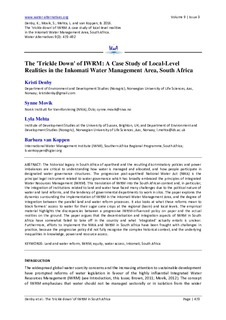| dc.contributor.author | Denby, Kristi | |
| dc.contributor.author | Movik, Synne | |
| dc.contributor.author | Mehta, Lyla | |
| dc.contributor.author | van Koppen, Barbara | |
| dc.date.accessioned | 2018-08-02T13:54:57Z | |
| dc.date.available | 2018-08-02T13:54:57Z | |
| dc.date.created | 2016-12-08T13:37:57Z | |
| dc.date.issued | 2016 | |
| dc.identifier.citation | Water Alternatives - An interdisciplinary journal on water, politics and development. 2016, 9 (3), 473-492. http://www.water-alternatives.org/ | nb_NO |
| dc.identifier.issn | 1965-0175 | |
| dc.identifier.uri | http://hdl.handle.net/11250/2507338 | |
| dc.description.abstract | The historical legacy in South Africa of apartheid and the resulting discriminatory policies and power imbalances are critical to understanding how water is managed and allocated, and how people participate in designated water governance structures. The progressive post-apartheid National Water Act (NWA) is the principal legal instrument related to water governance which has broadly embraced the principles of Integrated Water Resources Management (IWRM). This translation of IWRM into the South African context and, in particular, the integration of institutions related to land and water have faced many challenges due to the political nature of water and land reforms, and the tendency of governmental departments to work in silos. The paper explores the dynamics surrounding the implementation of IWRM in the Inkomati Water Management Area, and the degree of integration between the parallel land and water reform processes. It also looks at what these reforms mean to black farmers’ access to water for their sugar cane crops at the regional (basin) and local levels. The empirical material highlights the discrepancies between a progressive IWRM-influenced policy on paper and the actual realities on the ground. The paper argues that the decentralisation and integration aspects of IWRM in South Africa have somewhat failed to take off in the country and what 'integrated' actually entails is unclear. Furthermore, efforts to implement the NWA and IWRM i n South Africa have been fraught with challenges in practice, because the progressive policy did not fully recognise the complex historical context, and the underlying inequalities in knowledge, power and resource access. | nb_NO |
| dc.language.iso | eng | nb_NO |
| dc.publisher | Water Alternatives Association | nb_NO |
| dc.relation.uri | http://www.water-alternatives.org/index.php/alldoc/articles/vol9/v9issue3/333-a9-3-6/file | |
| dc.rights | Attribution-NonCommercial-ShareAlike 3.0 Unported (CC BY-NC-SA 3.0) | * |
| dc.rights.uri | https://creativecommons.org/licenses/by-nc-sa/3.0/ | * |
| dc.title | The 'trickle down' of IWRM: A case study of local-level realities in the Inkomati Water Management Area, South Africa | nb_NO |
| dc.type | Journal article | nb_NO |
| dc.type | Peer reviewed | nb_NO |
| dc.description.version | publishedVersion | nb_NO |
| dc.source.pagenumber | 473-492 | nb_NO |
| dc.source.volume | 9 | nb_NO |
| dc.source.journal | Water Alternatives - An interdisciplinary journal on water, politics and development | nb_NO |
| dc.source.issue | 3 | nb_NO |
| dc.identifier.cristin | 1410197 | |
| dc.relation.project | Norges forskningsråd: 213624 | nb_NO |
| cristin.unitcode | 7464,30,22,0 | |
| cristin.unitname | Vann og samfunn | |
| cristin.ispublished | true | |
| cristin.fulltext | original | |
| cristin.qualitycode | 1 | |

